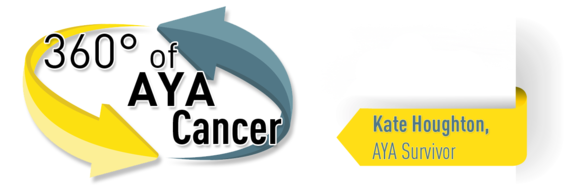By: Kate Yglesias Houghton
I work in politics; specifically, I'm in the business of elections. I get to see the pretty and the not-so-pretty of our political process. Like when an opponent accuses our African-American president of "playing the race card" or how a candidate competing to get on the debate stage overrun by men "only got there by playing the gender card."
We all have cards, don't we? That one thing that sets us apart from the masses, makes us unique in a crowded room and, for better or worse, defines us.
I have one, too, except mine is a physical, plastic, orange card that I keep in the back of my wallet and bring out once every three months when I walk into Johns Hopkins to get a blood test checking for a recurrence of acute myeloid leukemia (AML). It's my cancer card. Yep, it's that little piece of something that always reminds me that I'm still a cancer patient. That life wasn't all that fair to me and, at 27 years old, I walked into a doctor's office thinking I had the flu and walked out four months later with no hair, two port scars on my chest, countless emotional scars even I couldn't see, and an orange card that would identify me for the next ten years as someone holding her breath and trying her best to be grateful for this borrowed time.
During my first 27 years, I spent most of my time organizing friends, family, and co-workers to donate blood, participate in races for cancer research, and contribute to countless causes. In 2009, I was even part of a team of people who founded the Congressional Women's Softball Game, an annual charity event held in Washington, DC that supports young women diagnosed with breast cancer. (We've raised more than $750,000 in just seven years!) My mother-in-law once joked that I was her weirdest kid because I really did think I could change the world.
"The" world; not "my" world. I never imagined that some day I would be the recipient of the research I helped fund, that I would need 65 pints of blood product just to stay alive enough to get through chemo, and that I would have something in common with the young women survivors I met on the softball field. After my treatment was over, it was time to figure out how I was going to play my cancer card.
My room at Hopkins (where I was treated inpatient) was one of 20 in my unit. Each floor had four units and there was only one person other than me who was under the age of 50. (Except the nurses. All the nurses were my age.) I met the other "young" patient a couple of times. He was a friend of a friend. Most of our conversations revolved around the type of treatment we were receiving and what color our chemo was (his was blue, mine was red.) One question that always hung over us: What was the prognosis? No one knew. That's the best we could say to each other and that's the best I could tell anyone who asked. I didn't know if I were even going to survive the treatment, let alone be "cured". We were too young to even find comfort in statistics and probabilities. People our age just don't get cancer.
Well, that's completely wrong. In fact, 70,000 people between the ages of 15 and 39 are diagnosed with cancer each year, but we are the outliers. We aren't like the other 12 million people diagnosed each year. Cancer is the leading cause of death due to disease in this age group. Too many young people--like my friend in treatment--are dying from cancer. That's unacceptable. I'm playing my cancer card now.
There are more than two million people living in the United States who were diagnosed as adolescents or young adults and are currently in treatment or living as a survivor. We are unique but we should not be invisible. We want to be counted. We want to know how a treatment to save our life will impact our ability to work, to go to school, or to pick up our children from daycare. We want to know what our life will look like after the treatment. Can we have children? Do we need to move back in with our parents? Should we expect to be in and out of the hospital for the rest of our lives? What is the risk of secondary cancers? Will we even survive?
These are questions that we need the answers to, and hiding behind a lack of data is no longer adequate. We demand that every test find a place in a larger pool of research. That every adolescent and young adult has access to clinical trials. That our medical professionals are trained to answer our questions. That the next time a 27-year-old is diagnosed with leukemia, she doesn't have to hold her breath and wait to see if the treatment works and then ask what that means for the rest of her life. She will be able to speak to her doctors about her care and they will be able to answer her questions fully and confidently.
So this week, during National Young Adult Cancer Awareness Week and in all the weeks to come, I'm raising my bright orange card with my name and patient number and demanding that I be counted.
